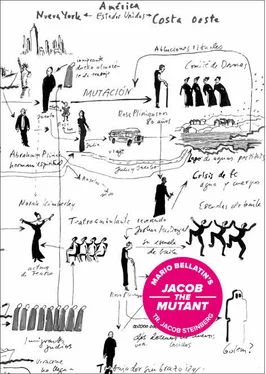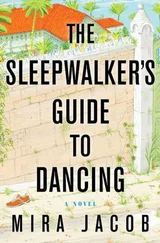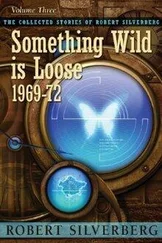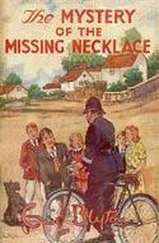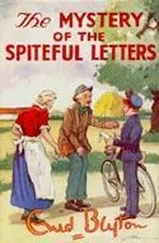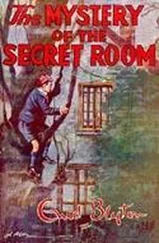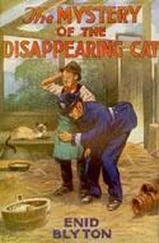Mario Bellatin - Jacob the Mutant
Здесь есть возможность читать онлайн «Mario Bellatin - Jacob the Mutant» весь текст электронной книги совершенно бесплатно (целиком полную версию без сокращений). В некоторых случаях можно слушать аудио, скачать через торрент в формате fb2 и присутствует краткое содержание. Год выпуска: 2015, Издательство: Phoneme Media, Жанр: Современная проза, на английском языке. Описание произведения, (предисловие) а так же отзывы посетителей доступны на портале библиотеки ЛибКат.
- Название:Jacob the Mutant
- Автор:
- Издательство:Phoneme Media
- Жанр:
- Год:2015
- ISBN:нет данных
- Рейтинг книги:3 / 5. Голосов: 1
-
Избранное:Добавить в избранное
- Отзывы:
-
Ваша оценка:
- 60
- 1
- 2
- 3
- 4
- 5
Jacob the Mutant: краткое содержание, описание и аннотация
Предлагаем к чтению аннотацию, описание, краткое содержание или предисловие (зависит от того, что написал сам автор книги «Jacob the Mutant»). Если вы не нашли необходимую информацию о книге — напишите в комментариях, мы постараемся отыскать её.
is a novella in a perpetual state of transformation — a story about a man named Jacob, an ersatz rabbi and owner of a roadside tavern. But when reality shifts, so does Jacob, mutating into another person entirely.
Jacob the Mutant — читать онлайн бесплатно полную книгу (весь текст) целиком
Ниже представлен текст книги, разбитый по страницам. Система сохранения места последней прочитанной страницы, позволяет с удобством читать онлайн бесплатно книгу «Jacob the Mutant», без необходимости каждый раз заново искать на чём Вы остановились. Поставьте закладку, и сможете в любой момент перейти на страницу, на которой закончили чтение.
Интервал:
Закладка:
The more that we wash our feet, the ga’ava —ego — is nullified in a very effective way.
That American community couldn’t have known — here from my prayer cell I am certain of this — that the dances performed according to certain premises also help nullify idol worship.
Idolatry, and not monotheism, in that city of the Far West, so far from the centers of theological debate?
Jacob understood through his readings of the Books that in those moments when the permanence of the idea of monotheism stood on shaky ground, Hasidic leaders brought their villagers, in any way possible, to spaces favorable to dance.
The leaders should not offer great explanations to make their people dance.
It was enough for them to congregate in the main city squares and voice the phrase:
Wash your feet (Genesis 18:4).
But under the conditions the village found itself in — here we are referring to that place where Jacob was asleep, where his tavern was located — it was impossible, due to the new order’s incursion, to carry out any activity capable of bringing that spiritual wind to their hearts.
The only secret task was that which the cousin was carrying out in the solitude of what had once been the shed of Jacob’s house.
Upon hearing of the proclamations outlawing dancing, which were being hung up on the main walls of the village, the cousin couldn’t think of any idea better than making a tiger dance with a seal (which some poor man had brought Jacob from the Russian seas).
The cousin’s stuffed animals began to dance in a sort of ecstatic parody of movement.
As the prohibitions for the community members increased, the animals of the Tiny Nocturnal Zoo performed the most bizarre dance steps one could imagine.
Rounds of penguins, dhikrs —ancestral dances — made up of glass-eyed orangutans.
This far along into the new reality that the village was living, the inhabitants — one by one, even the most timid — understood that they were being called upon so that a luminous wind would reach their hearts, one which can only be brought about by lifted feet.
But the lifting of feet that the inhabitants of the village were being called to was not that which was usually obtained through dance — that is to say, that which tradition had prescribed — but rather the new members of the order arrived with the gospel that that state would only be reached through labor — the only action capable of liberating men.
Only labor will set you free , seemed to be the contemporary declaration.
For that purpose, the authorities invited the villagers to prepare their bags with the most basic items in advance.
They were then driven to the train that would take them to the promised paradises.
Many believed that they were being called upon not only to carry out a task of physical purification, but also that they were being summoned to carry out a true prayer.
They furthermore believed — let’s not forget that we are discussing a community composed of simple beings, many of whom spent their nights drunk in that tavern managed by the rabbi’s wife — that they were called upon to practice a prayer that reached such lofty heights that, at that point, it was not possible to demand any further explanation.
In other words — standing sorted into the lines that were congregating at the train station — they thought that they were invited to carry out an action that, in those moments, it was impossible to comprehend.
They had the understanding as well that, in order to do what was being requested of them, they ought to carry out an activity similar to some form of corporeal liquidation— lehitpashtut hagashmiut —which in other terms means “to shed one’s body.”
Finally the members of that small community were taken into account by somebody other than themselves.
Throughout the centuries they had been a forgotten part of the Empire and now, finally, the inhabitants held an importance for someone other than God.
They no longer merely formed part of a Divine — and consequently, intangible, as Jacob had informed them on more than one occasion — Plan, but they now belonged also to a project invented by men, ones who had taken up the work of noticing their existence.
It was precisely in this moment that what we could identify as a sort of social ecstasy appeared, and under the sunlight of that spring morning the colorful parade of neighbors could be seen, each person carrying his or her own suitcase.
While this all was occurring, Jacob continued to sleep, and his cousin continued on with his task of making the dead animals dance.
What happened next is history.
When Jacob awoke, the village was almost empty.
Not a soul could be spotted in the streets.
The businesses and the synagogue — shut down.
Where are our Catholic brothers? Jacob dared ask.
It seems as though they, too, had left.
That they were not in the village despite remaining present.
According to what Jacob later found out (this passage doesn’t appear in the work Jacob the Mutant ) many of the villagers continued on there in the village, carrying out their normal daily labors and yet Jacob was incapable of seeing them.
Could this phenomenon of the transparency of outside bodies be related to a variation of the many Sephirot that we men tend to fall into when our souls are thus attuned?
In reality, the only ones who had left the village were those individuals who, up until a few weeks prior, had been required to wear a sign around their necks.
But for Jacob that place was nothing more than a ghost town.
Jacob observed this from his bedroom window.
Next to his window stood the empty bed, left behind just a month earlier by his wife.
When Jacob left home and approached the shed, he could see his cousin in the midst of the dance that, at that point, he had spent days arranging.
Despite being a static dance by nature, the cousin took charge of frequently varying it.
When he felt that the ostrich had been dancing with the rabbit for too long, he would — quite suddenly — switch their partners.
At a certain point, Jacob touched the cousin on his back and told him that it was time to set out for the diaspora.
To help him place the stuffed animals into the wagon where he had once transported the Russian fugitives.
He urged him to then follow, without wasting any time, the paths he knew so well by memory from having trafficked so many people while the tavern was running.
After a few unexpected events they arrived, all the while pulling the wagon, to one of the ports ships departed from.
There the cousins were faced with a dilemma: the two of them could not travel with the wagon on the same boat.
There wasn’t enough space.
Either the two of them could travel together and leave the wagon at the port, or just one could go while the other waited for the next departure, which would set sail with more space.
Jacob boarded the first ship alone.
There, on that trip, he became ship brothers with the man who would later give him the lands where he was to take roots with his recovered wife — as is known, once in New York Jacob convinces his former wife to return to him — in front of a lake situated in a city overcrowded with dance academies.
His cousin boarded the second ship, which left ten days later, with the wagon with those animals that once made up the Tiny Nocturnal Zoo.
But something happened at sea.
Mid-voyage the notice came that Jacob’s ship would be the last to be granted entry into the United States without visas for its passengers.
As a result, the cousin’s ship docked in Veracruz.
This is the reason why the stuffed animals remain until this day in the basement of a house on Calle Ideal in Mexico City, a place where the taxidermist cousin eventually ended up settling down.
Читать дальшеИнтервал:
Закладка:
Похожие книги на «Jacob the Mutant»
Представляем Вашему вниманию похожие книги на «Jacob the Mutant» списком для выбора. Мы отобрали схожую по названию и смыслу литературу в надежде предоставить читателям больше вариантов отыскать новые, интересные, ещё непрочитанные произведения.
Обсуждение, отзывы о книге «Jacob the Mutant» и просто собственные мнения читателей. Оставьте ваши комментарии, напишите, что Вы думаете о произведении, его смысле или главных героях. Укажите что конкретно понравилось, а что нет, и почему Вы так считаете.
